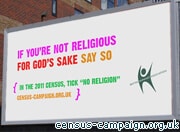Humanists, eager to see a reduction in the number of people that identify with Christianity, are launching a poster campaign next week ahead of the upcoming census.
During the last census in 2001, 42 million people chose to identify themselves as Christians – almost 72 per cent of the population.
But the British Humanist Association (BHA) believes the number of non-religious people is under counted in the census and the number of Christians is over counted.
Campaign
Campaigning under the slogan: “If you’re not religious for God’s sake say so”, the BHA is also calling on people to ‘Take the pledge’ to tick “No religion” on the census.
This year’s census will take place on 27 March. The BBC reports that a BHA poster campaign on buses and at railway stations will begin next week.
The BHA’s head of public affairs Naomi Phillips said the census results on religion are used to “justify maintaining faith schools”.
She added: “It means more budgets go to Christian groups and the needs of non-religious groups are not taken into account.”
Affiliation
Last year the Integrated Household Survey, which analysed the responses of almost 450,000 adults, revealed that 71.4 per cent of the population identify themselves as Christians, a figure similar to the 2001 census data.
Question 20 on England and Wales’ census will ask: “What is your religion?”. Answering the question is voluntary.
The first option on the question is “no religion”, followed by options including Christian, Buddhist, Muslim and “Any other religion, write in”.
The Office for National Statistics, which collects the census data, told the BBC: “The religion question measures the number of people who self-identify an affiliation with a religion, irrespective of the extent of their religious belief or practice”.
In 2009 the BHA backed an advertising campaign which declared “There’s probably no God”.

